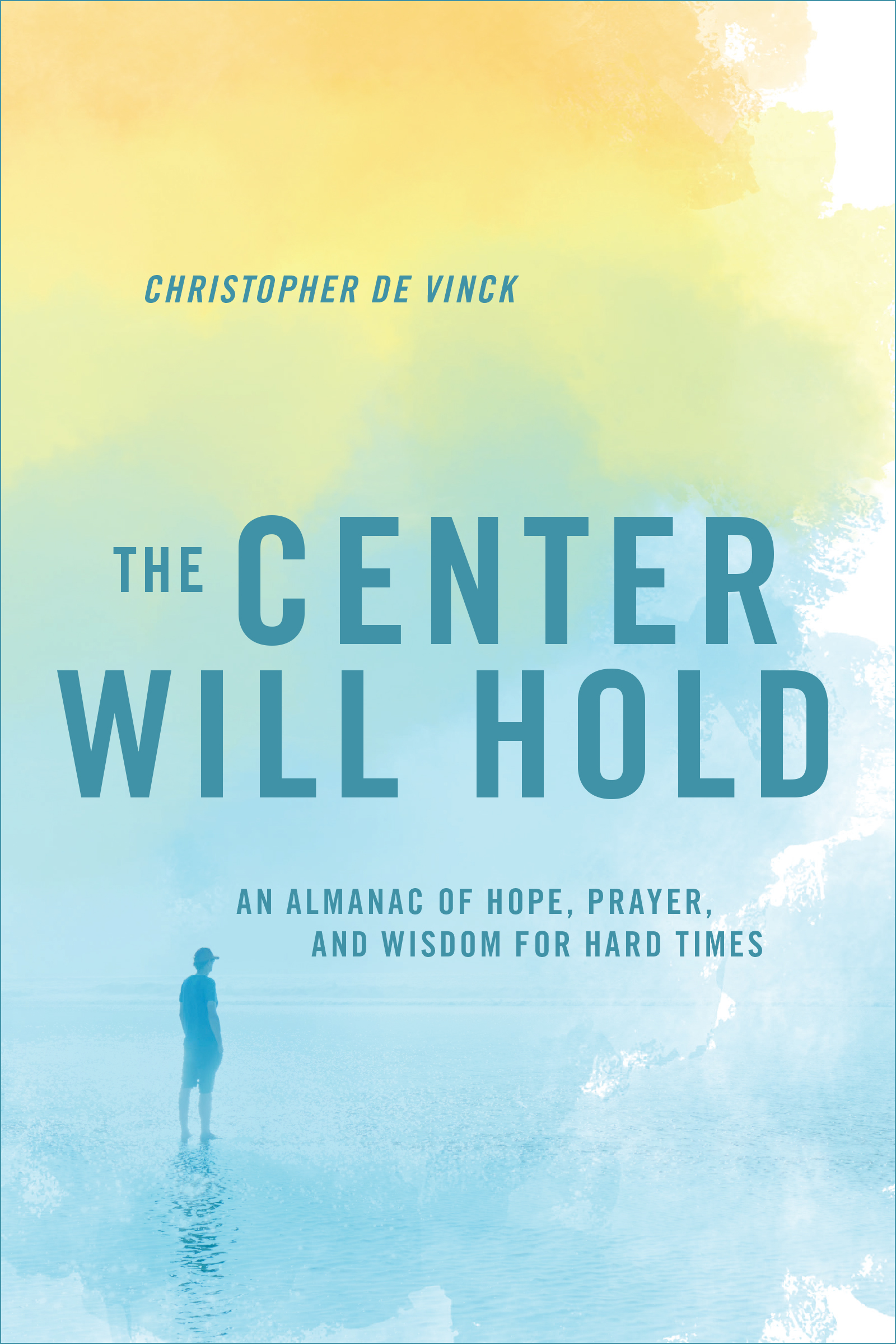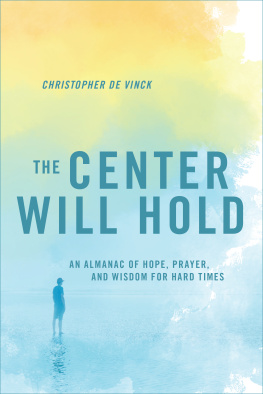

3441 N. Ashland Avenue
Chicago, Illinois 60657
(800) 621-1008
www.loyolapress.com
2020 Christopher de Vinck
All rights reserved.
Unless otherwise indicated, Scripture quotations are taken from the Holy Bible, New International Version, NIV. Copyright 1973, 1978, 1984 by Biblica, Inc. Used by permission of Zondervan. All rights reserved worldwide. www.zondervan.com
Bible quotations marked ESV are from The Holy Bible, English Standard Version. ESV Text Edition: 2016. Copyright 2001 by Crossway Bibles, a publishing ministry of Good News Publishers.
Bible quotations marked NASB are from New American Standard Bible. Copyright 1960, 1962, 1963, 1968, 1971, 1972, 1973, 1975, 1977, 1995 by the Lockman Foundation.
Bible quotations marked KJV are from the King James Version. Public domain.
Bible quotations marked NKJV are from the New King James Version. Copyright 1982 by Thomas Nelson. Used by permission. All rights reserved.
Bible quotations marked ERV are from the Easy-to-Read Version. Copyright 2006 by Bible League International.
Cover art credit: the_burtons/Moment/Getty Images and Loyola Press.
eBook ISBN: 978-0-8294-4931-0
Based on the print edition: 978-0-8294-4930-3
Library of Congress Control Number: 2020933327
20 21 22 23 24 EPUB 5 4 3 2 1
To Roe
In Wallace Stevenss poem Prelude to Objects, he wrote about the stairs, that sweep of an impossible elegance. I think of our lives as a grand sweep of stories, an impossible elegance rolled out before us as we manage each day with hope and courage. How we interpret these ordinary stories defines who we are as people of faith.
British journalist Malcolm Muggeridge wrote, Every happening, great or small, is a parable whereby God speaks to us, and the art of life is to get the message.
I have been to Paris; I have been to Rome. I have been to London, Brussels, Copenhagen, Vancouver, Portland, New York City. Ive traveled to Austin, San Antonio, Chicago, Los Angeles, Seattle, Atlanta, Grand Rapids, Fort Lauderdale, Denver, but no place is more exotic to me than the stories of my past, parables with hidden messages filled with the elegance of my grandfather tending to the rose garden or the stillness of a praying mantis on the grass.
When I was a boy, my grandmother took half a sleeping pill before going to bed for the night. She took only half because she feared that the side effects of a whole dose might ravage her fragile stomach. It was my job to split the pill and pour a glass of water for her as she prepared for bed. Often, after my grandmother swallowed the pill and drank her water, she would sit on the edge of her bed, smile, and show me once again the picture of my grandfather that she had on her nightstand.
He died many years before she did, but each night she said a prayer beside his photograph, and each night she looked at me and smiled with great pride and love for the man she had been married to for over sixty years.
Each night my grandmother told me a small story about her husband: how he rode his horse in the parks in Brussels in his generals uniform, how he survived World War I and World War II, how he loved to plant roses in the garden. Those stories comforted my grandmother before she slept, and then in her sweet, soothing voice she blessed me with a small, invisible sign of the cross that she placed on my forehead with her thumb.
A cross and a sleep-well shed say in Flemish, and then my grandmother lifted her old legs into her bed, pulled her covers to her chin, and smiled. Id kiss her good night, click off her lamp, and in the subdued darkness Id see her adjusting her pillow, and Id see my grandfather looking back at her from the picture frame, and then Id quietly leave the room and close the door behind me.
This story of my grandmother still sustains me before I go to sleep as I remember her message of love, and as I remember her blessing on my forehead.
Did my grandmother dance a waltz with my grandfather in her dreams each time she fell asleep?
It is in the parables of our lives that we can seek to understand the wisdom that these messages bring. But how do we enter this place of wisdom now that it seems our world is falling into a Godless time? How do we switch our minds from the troubles of the day to the comforts of the soul?
The poet Luci Shaw said that we have a now you see Him, now you dont God. We have Himself clothed in visions, in dreams, in metaphors, in parables, in the poetry of the Bible, and in all the ordinariness of the lives we live. That is where we find answers: in the ordinariness of the lives we live.
Often, during my talks across the country, someone invariably comes up to me and says, Oh, Dr. de Vinck. I like your stories so much. They remind me of so many of my own memories. I like how they sound. They soothe me, they remind me of my own past and my own moments of happiness.
Time and time again people tell me that my essays conjure up images of their childhood, or their grandmothers, or their happy summer memories when they were young. People look at my books and then review the albums of their lives and take delight in the nostalgia of goodness. That is where we find comfort for our souls: in the messages that we are given as we live through our life parables. We just have to learn how to see and listen.
At the end of the day we seek peace. I thought about people coming to me and saying how my books remind them of their own memories. I thought about how the memories of my grandfather and his photograph guided my grandmother to sleep.
Perhaps I can guide you to interpret your own stories, those precious memories that will remind you that the past offers hints of what is holy and comforting. A parable is a story filled with wisdom that will guide us along the way. Our memories store those parables and will protect us in the future when we need them. Perhaps I can recreate my grandfathers soothing presence for all who read this book.
As Tennessee Williams wrote in his play The Glass Menagerie, memory is seated predominantly in the heart.
I hope this book helps you to interpret the memorable and somewhat mysterious stories of your own life, that it helps you uncover what is predominantly in your heart: love, acceptance, courage, goodness, and peace. May God bless us everyone.
Christopher de Vinck
Pompton Plains, NJ
January 2018
The sun is hot on my neck as I observe
The spikes of the crocus.
The smell of the earth is good.
Edna St. Vincent Millay
For our boast is this, the testimony of our conscience,
that we behaved in the world with simplicity
and godly sincerity, not by earthly wisdom
but by the grace of God, and supremely so toward you.
2 Corinthians 1:12, ESV
In February 1948, my mother and father arrived in New York from Belgium on the Queen Elizabeth. They quickly settled into an apartment in New Jersey, and on his first day of work, my father returned home filled with enthusiasm and said to my mother, I saw a blue bird! A blue bird!
My mother, finding this to be incredulous, listened with eagerness as my father described the color of the birds wings and the blue cap of its head. Neither my mother nor my father had ever seen a blue bird before.













